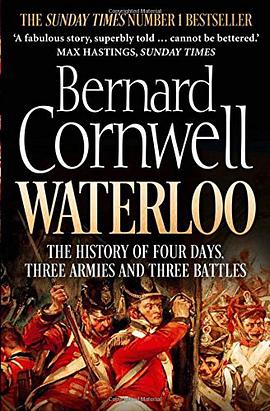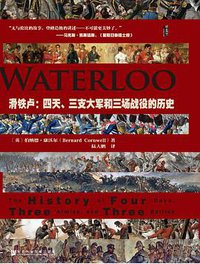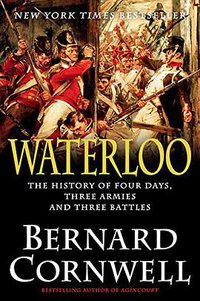Waterloo
豆瓣
The History of Four Days, Three Armies and Three Battles
Bernard Cornwell
简介
#1 Bestseller in the U.K.
From the New York Times bestselling author and master of martial fiction comes the definitive, illustrated history of one of the greatest battles ever fought—a riveting nonfiction chronicle published to commemorate the 200th anniversary of Napoleon’s last stand.
On June 18, 1815 the armies of France, Britain and Prussia descended upon a quiet valley south of Brussels. In the previous three days, the French army had beaten the Prussians at Ligny and fought the British to a standstill at Quatre-Bras. The Allies were in retreat. The little village north of where they turned to fight the French army was called Waterloo. The blood-soaked battle to which it gave its name would become a landmark in European history.
In his first work of nonfiction, Bernard Cornwell combines his storytelling skills with a meticulously researched history to give a riveting chronicle of every dramatic moment, from Napoleon’s daring escape from Elba to the smoke and gore of the three battlefields and their aftermath. Through quotes from the letters and diaries of Emperor Napoleon, the Duke of Wellington, and the ordinary officers and soldiers, he brings to life how it actually felt to fight those famous battles—as well as the moments of amazing bravery on both sides that left the actual outcome hanging in the balance until the bitter end.
Published to coincide with the battle’s bicentennial in 2015, Waterloo is a tense and gripping story of heroism and tragedy—and of the final battle that determined the fate of nineteenth-century Europe.
contents
Bernard Cornwell was born in London in 1944 - a 'warbaby' - whose father was a Canadian airman and mother in Britain's Women's Auxiliary Air Force. He was adopted by a family in Essex who belonged to a religious sect called the Peculiar People (and they were), but escaped to London University and, after a stint as a teacher, he joined BBC Television where he worked for the next 10 years. He began as a researcher on the Nationwide programme and ended as Head of Current Affairs Television for the BBC in Northern Ireland. It was while working in Belfast that he met Judy, a visiting American, and fell in love. Judy was unable to move to Britain for family reasons so Bernard went to the States where he was refused a Green Card. He decided to earn a living by writing, a job that did not need a permit from the US government - and for some years he had been wanting to write the adventures of a British soldier in the Napoleonic wars - and so the Sharpe series was born. Bernard and Judy married in 1980, are still married, still live in the States and he is still writing Sharpe.

